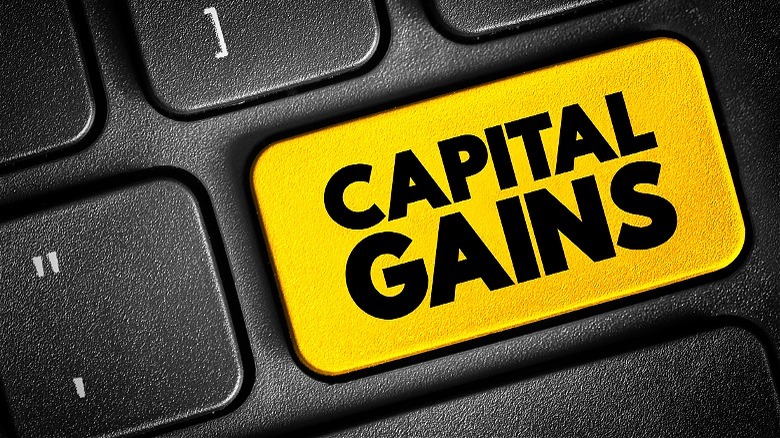Is Cryptocurrency Taxed?
In 2023, the flagship cryptocurrency bitcoin experienced a price appreciation over 150%, and has continued that trend into the new year. With only a few weeks remaining before the deadline for U.S. citizens to file 2023 income taxes, you might be wondering if any of that crypto good fortune is a taxable event?
For a little background, the IRS classifies cryptocurrency as a digital asset. Besides cryptocurrency, the IRS' description of digital assets also stretches to include stablecoins and non-fungible tokens, or NFTs. The former is similar to cryptocurrency, but tied to an asset price, like U.S. dollars or gold, while NFTs are a unique digital identifier that represents a real world object like art or music.
The good tax news is that buying and holding cryptocurrency or other digital assets isn't a taxable event, even if it gains significantly in value. Similarly, you can transfer crypto between digital wallets under the same ownership, or gift digital assets without tax consequences. However, when you sell cryptocurrency that's appreciated in value, spend it on goods or services, or trade for a different type of crypto, that capital gain is realized, which triggers tax obligations. Also, if you're on the receiving end of crypto as payment for goods or services, that amount may be subject to income tax just as if you were paid with cash, check, or credit cards.
Capital gains tax
Just like conventional assets, such as shares of stock or ETF investments, when cryptocurrency is sold for a higher price than the initial purchase price, then it's necessary to pay capital gains tax on the windfall. For instance, if an investor purchased one BTC for $30,000 and then later sold it for $40,000, capital gains tax is owed on the $10,000 profit.
This scenario is commonplace to any investor, but where the situation gets more complicated is when cryptocurrency that's appreciated in value since being acquired is used for the direct purchase of goods or services. In the case of other investments, like shares of stock, the stock would typically be sold and thereby converted to cash, which can be used to purchase goods or services. But since cryptocurrency is, well, a virtual currency, some vendors might accept it directly as payment.
So what happens when you've purchased one bitcoin for $30,000 and later decided to use it to purchase a sports car worth $40,000? You'll still owe capital gains on the $10,000 jump in realized value. Due to the sometimes furtive nature of cryptocurrency, you might need to be more diligent about record-keeping than with other types of investments; for example, you might document the amount of crypto spent and its market value at the time. Similarly, buying, selling, or spending NFTs will require a greater degree of bookkeeping than traditional assets held at a brokerage firm that readily provides account statements and tax forms each year.
Just how much is capital gains tax anyway?
Capital gains tax varies based on both your income and the amount of time that you've owned the asset. To start, gains from assets that were held for a year or less are appropriately called short-term capital gains. Short-term capital gains are taxed at the same rate as a person's regular income and depending on which federal tax bracket you're in, will be taxed at a rate between 10% and 37%. On the other hand, profit from the sale of assets, including cryptocurrency, that are owned for more than one year — even if it's one year plus one day — prior to being sold are subject to long-term capital gains tax rates, which are lower than short-term rates.
How much lower is long-term capital gains? For 2023, single filers with up to $44,625 in taxable income pay 0%. Perhaps more realistically, single filers with between $44,626 and $492,300 in taxable income pay 15%, while single earners making $492,301 or more pay 20% long-term capital gains tax. Hence, if you're considering selling or spending cryptocurrency — or any asset, for that matter — which has risen in value during your ownership tenure, it's advisable to wait until more than one year has passed, if at all possible.
Business accepting or mining crypto must pay income tax
Besides investing in crypto, you may find that you've received some crypto as a payment for goods or services. For example, a general contractor receives one bitcoin worth $40,000 as payment for a worthwhile home renovation project. In that case, the contractor would owe income tax on the net proceeds from the $40,000 job, in the same manner as if he or she was paid with cash or check. If the cryptocurrency payment is immediately sold or spent, there would be no further tax consequences.
However, if the business owner who received the bitcoin payment decides to hold the crypto for a period of time and it rises in value from $40,000 to $50,000, that $10,000 gain would be subject to short- or long-term capital gains tax. Finally, proceeds from creating or mining crypto are treated as regular income unless the mining enterprise is a business, in which case the inputs, like computer hardware and electricity, can be deducted from the gross income.
As a quick summary, if you sold cryptocurrency for fiat currency (i.e., regular money), used it to purchase goods or services, or traded it for a different type of crypto, you'll owe capital gains tax, assuming the crypto appreciated from when you initially acquired it (your cost basis). Businesses that accept crypto payment or mine new cryptocurrency will pay income tax on the profit, but may later be subject to capital gains tax as well if they hold (or is it HODL?) the cryptocurrency and it increases in value.



